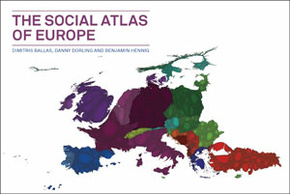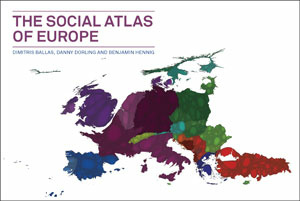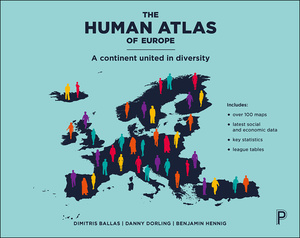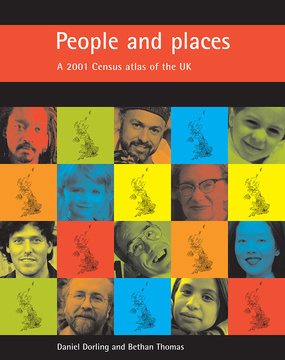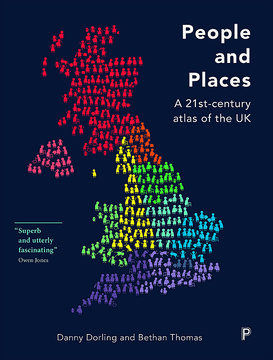The Social Atlas of Europe
By Dimitris Ballas, Danny Dorling and Benjamin Hennig
Published
Jun 25, 2014Page count
256 pagesISBN
978-1447313533Dimensions
270 x 190 mmImprint
Policy PressCHOICE OUTSTANDING ACADEMIC TITLE 2015
Many of us think of European countries as discreet entities—their own languages, cultures, food, and economies squarely contained within their national boundaries. But in fact Europe is at once a unified place and a sophisticatedly fragmented one, and national boundaries rarely reflect its social and economic realities. The social atlas of Europe is the first atlas to map Europe according to these realities, from the perspective of human geography rather than simply a political one.
Using innovative full-color visualization methods, it reconsiders European identity through its many different facets: economy, culture, history, and human and physical geography, visualizing Europe and its people in a more fluid way, in some cases using maps without artificial national boundaries. It utilizes the latest available demographic, social, and economic data through state-of-the-art geographical information systems and new cartography techniques. Through these new visualizations, this highly illustrated book offers fresh perspectives on a range of topics, including social values, culture, education, employment, environmental footprints, health and well-being, and social inequalities and cohesion. It is a bold rethinking of Europe as we know it and will be of interest to anyone who wants to understand the continent in its truest form.
“Simply browsing this Social Atlas of Europe is an exhilarating experience for the lay reader: unfailingly informative, sometimes intriguing, and always entertaining. A triumph of human geography and human cartography!” Manos Matsaganis, Polytechnic University of Milan
“Once again this innovative group of academics open our eyes to something hidden in plain sight. This time, with refreshing accessibility, it is the way we see Europe. A must read!” Mary O’Hara, journalist and Fulbright scholar
"Using two base maps which resize first EU Member States and their neighbours, this innovative new book succeeds in graphically representing statistics and survey answers such as 'Youth unemployment' and 'Democracy: is it the best political system?'" TUC Education European Review
“An insightful look at today's Europe -- not through the artifices of geographic boundaries or gross national products, but through the underlying realities that Europeans live every day - their understandings, attitudes, and well-being - all brought to life in charts and maps that reveal the human geography of this vitally important area of the world.” Robert B. Reich, Chancellor's Professor of Public Policy, University of California at Berkeley
"A striking visual map of a dynamic and rapidly evolving Europe." Choice
"The authors’ innovative use of the cartogram reveals a unique and hitherto unknown view of Europe which will be of wide interest." Professor Dr Menno-Jan Kraak, University of Twente, Netherlands
“A work of and for the decade, The Social Atlas of Europe sets out to explore European identity through the social realities experienced by Europeans.” LSE Review of Books
"A must for social scientists and decision-makers wanting to have a better understanding of the institutional forces that unite and divide Europeans.” Andrés Rodríguez-Pose, London School of Economics and President-elect of the Regional Science Association International.
Dimitris Ballas is a Senior Lecturer in the Department of Geography at the University of Sheffield. He has published widely in the field of Geoinformatics in the Social Sciences.
Danny Dorling is a Professor of Human Geography at the University of Oxford. His recent books include The 32 Stops: Lives on London’s Central Line and Bankrupt Britain: An Atlas of Social Change
Benjamin D. Hennig is a geographer who loves maps. He is a Senior Research Fellow at the University of Oxford and maintains the website www.viewsoftheworld.net
Introduction;
Identity and Culture;
Demography;
Education;
Employment;
Industry and Occupation;
Health;
Politics;
Economy;
Environment;
Social Cohesion;
Policy;
Conclusions.







